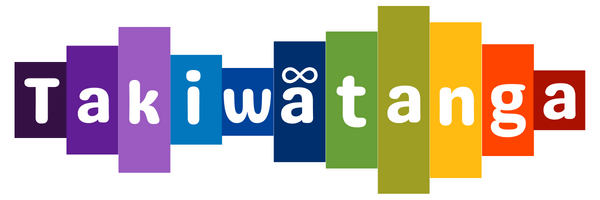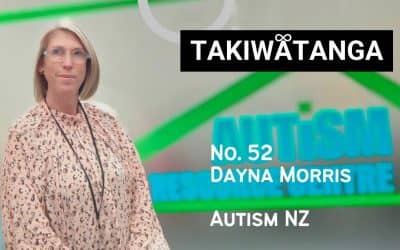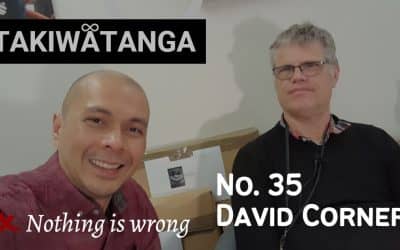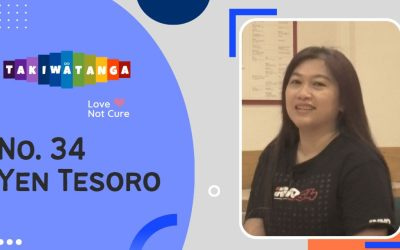Here is the unedited transcript of the interview.
1. Who is Keri Opai?
Ha! Do I have to? Smiling… I’m Keri Opai, I’m from Taranaki. So my Iwi are;
Te Atiawa, Ngāti Ruanui – Taranaki Iwi
Ngāti Te Ata – Waikato Iwi
Ngāti Te Ata – Waikato Iwi
Waiohua – Auckland Iwi
Waiohua – Auckland Iwi
Ngāti Porou – East Coast
So those are my Iwi affiliations. I was brought up in Taranaki. I was brought up by the sea. So that’s my go-to place when I have to think and relax. Contemplate things. So I went to the sea when I was coming out with autism with Takiwātanga. I was lucky to be taught by elders. I am very very fortunate to be taught by my Taranaki elders. In my home in Taranaki in New Plymouth, Te Hāwera , in those places. Main thing is that I was very lucky to have those good ears and listen to my elders that thought me from a young age. Hopefully that has held me in good stead.
2. Can you tell us about Te Reo Hāpai, the glossary which you have authored and how this would help the mental health.
One of the entities I worked for 5 years under the Wise Group was called Te Pou o te Whakaaro Nui at that time. It is now called Te Pou. In my work as a sort of Cultural Adviser. You know, as consultant, a person who works out what the tikanga are. What the protocols are and spend time with our kaumātua (Māori elder). In that role, I sort of saw things being written from the government, from all different agencies. They were spelling Māori things wrong. It didn’t have words for some things. Maybe I can help with that. You know, make it consistent, make it clear. And have some POSITIVE Māori indigenous world views.
3. How long did it take for this to finish? (Referring to Te Reo Hāpai – The Language of Enrichment).
I spent the next two years working on this glossary. Creating words, For mental health, or addiction, or disability with a real spin of BEING POSITIVE, and of BEING INDIGENOUS.
So, a lot of the words in english are being based on medical models. They were often, you know, deficit based, you know, disability you know, you don’t have much of ability. And so, I consulted with people, I spent time with people, and clinicians and just went, you know, what is that like, What is Williams Syndrome, what is it about. What’s autism like for you? So I wanted to spend time with people that were affected with these things. Not just professionals, not just medical professionals. I like to make up words that reflect how that person wants to define himself. Themselves, you know, that sort of things. So, right from then I first had the idea, to when I launched it, in Auckland, Hamilton, Wellington, and Christchurch, and Taranaki. Probably, At least, two full years. So that was in 2017, now 2020
Having the launched of the online version, making it more accessible to people around the world. And, you’ll be able to push a button and hear how it sounds, so you can hear how to pronounce it. All that sort of stuff. Around the country we have probably given out I think about 10,000 copies. And around the world, people have downloaded it I think at least 8,000 times.
On all different continents, you know I never would have thought in Russia, or in Yugoslavia. Everywhere they have downloaded a copy and learning from it, so it’s amazing. And so when I was working out the definition of autism in Māori, I was very lucky to have a good boss. She said look, go to the sea, go to your happy place where you can contemplate So I went out to Raglan here and I stayed there for a week and I just watched the sea come in listened to the rhythm of the waves, watched the birds feed, watched the weather changed.
And while I was there I worked for the translations in a lot of those words and Takiwātanga was one of them. Luckily with autism, I have a lifelong friend. A good friend of mine, really neat guy. Peter is his name, so, we met in school. And , the bullies would beat him up. You know, four of them would beat him up. And if I saw it, I would get in the way and say Come through me you know. They were cowards, they would always run away, you know. They never ever wanted to… and get to hiding. But they hurt somebody else that couldn’t defend themselves. I hated that. So we just became mates out of that. Good friends. So I thought with my friendship with my mate Pete, really, it was just he was a little bit out of step with people hat didn’t have autism. It just was a different life rhythm. And if you sort of leaned in And spend time with them, you’ll get used to it and it was fine. I never sort of think of him as an autistic guy you know, we just go out there and have a laugh. So when I consult with other autistic people and think about time with my mate They just have their own rhythm to life you know. And I wanted to reflect that in the words. And so I thought… I think the word for autism should be, Takiwātanga – In his/her/their own time and space I thought it would be quite life changing for a lot people in Aotearoa, but I didn’t expect that around the world, people were going “Wow! That’s a great way of saying it.” Neuro Scientists would email me and say, “Thank you for summing up in one word what it takes me 400 pages to write in a thesis.”
I’m not an expert or anything but I, I just based it on positive Māori indigenous world views and my friendship with Pete and you know, consulting with people But autism is the one that really taken off the world. You know it’s great, other indigenous people are, are emailing me and say, “Wow, if you can do this, maybe we can do it too!” I don’t think people realised how important language is, you know, Like the bullies at school, you know, you can You can choose how you treat people. With language, if you want to crush someone’s spirit That’s how you can do it. If you want to uplift them, if you want to give them respect, that’s also how you do it. So I hope that my words are respectful and positive.
Thanks for that as well. I don’t remember if I was able to thank you with coming up with that word as well. One of that challenges that we are having right now is having that assessment, of course any parent/s can assess their kids but is it the standard assessment? Is it right, is it that correct assessment? But having three kids, you will realise that they are ok and then the other one, he wants his own space, which kind of resonated with me as well. As much as always wanting to have so much space. When his brother or sister is playing, he is also playing, but parallel playing. Me and my wife were talking about it, we have discussed, we might need to do something about it. We need to help him, he’s just different. We need to make sure that he gets the right education. The right treatment (what I mean is to be treated as a human being not to be judged because he is not a typical person). That’s how I saw it, just different. If you can re-frame Autism or Williams syndrome or all other things that people talk about. from quite a negative way. I think it’s worth reframing it and going, actually it’s just different What are some things that we could do to get the best out of the situation. I know that sometimes it could be challenging but sometimes like my mate it’s a real gift.
He’s a fantastic musician you know. And he goes around that time at homes and entertains people up. He can play all these different instruments. Remember all the words, singing out beautiful. So you know, Just play with our strengths you know. Like you said, we’re all about strengths. So I think play to those. When I was having a conversation with my wife I said, If I am having a problem like this or we are having a problem like this probably there is still one family, or probably more, having the same challenges. That’s why we’re thinking like, it’s actually been long overdue for me, for my endeavour In terms of how I wanted to help other people. I have been thinking of what non-profit should I support. I kept on thinking, I kept on going outside my area of comfort. And then suddenly when I realised that my son is likely to have an autism so why not do something about autism
That you can help other people as well.
4. What did you do in terms of being motivated every day to come up with this. (Referring to Te Reo Hāpai)?
One thing is I take the right amount of time.
Takiwātanga I think it probably took me six months. to come up with that word. So the first thing is I take the right amount of time to do it.
I never ever want to rush those things. It took me at least two years to do those terms and I think there are about 200 there. I believe, to give it respect, you have got to take a good amount of time
and talk with the right people. You can’t rush this, you know. There wasn’t a word for autism before. For however many years we have the word autism, there wasn’t a Māori word for that. So, it’s going to be for the next 50 years so I have to make sure it’s right. It’s kind of like art, science, and grammar, and Māori world views. For me, it came together when I could just sit in the environment, in a natural environment where I am at the most comfortable as an indigenous person. Growing up by the sea… I grew up by the sea. If I threw a rock from my house, it will go in the sea That was my backyard.
That’s where I go to, to think. Just a quick narrative. When I was a teenager, Did I, did I really hear that? And he said “Go and listen to what the sea has to say.” And I thought… What was that mean? But he was saying exactly that, he was saying Go to the sea, where you are comfortable. Where you can think. Let nature just take hold.
Don’t think too hard. Just experience it, watch the waves. Listen to the rhythm. Smell the sea, let it hit your skin, feel it you know and relax. I went to the sea and did that, you know, I did find peace. And I could work out the answers, you know to the problems I was having. So I have always done that since then Go and listen to what the sea has to say. That’s pretty cool. I think when they say like, go and relax… you need to relax. Don’t think of other noises around. Just relax… ’cause you are right, the world is quite noisy. Lot’s of things happening and you have got covid and all sorts of things. You know, it does take your time and energy thinking about those things. If you can find a place. Or a time or where ever you feel comfortable. It kinda heals your spirit. Some people, that’s the bush, or the forest. Some people, it’s the mountain. Some people, it’s the sea. You know, whatever you find to sort of be calm with yourself. You are just able to contemplate a bit more. And not being so distracted by all the busy-ness of the world. Is there a restriction of me using the language… because I wanted to make sure I am not stepping into someone’s toes. You mean, using the word Takiwātanga?
No, no, please, look… I made it up folks, so I am giving Lloyd the permission to use it. And people, please use it.
Because it promotes positive re-imaginings of what autism means
I created that book, and all the words in it, to be free, accessible to everyone to use them if they want to and on the online version, I want everyone to be able to hear how it’s pronounced and be able to pronounce it.
It’s all free you know, and open for all people to use. The only thing is that I’d say if people takes things out of it. Can you not make a profit out of it? It’s not for profit. Some people have said to me, I wanna do this and make money out of it. It’s not about that… It’s about reframing, some of those things, mental health, addiction, and disability into a more positive and indigenous world view so that’s the only sort of caveat I would say, you know. It’s not about making money. It’s about making people feel more comfortable. It’s about who they are. I want people like Pete to have a great life. And not to be judged, be bullied, and all those sorts of things. Hopefully my words go towards that… Hopefully, Takiwātanga does that as well. I am also creating a website for this, that’s why I wanted to make sure I get it right. I create a website then someone from the Māori community doesn’t want it because I am not Māori. That’s why I wanted to make sure I give respect, especially to you, you created it. You know I appreciate that because, you know, a lot of people have actually, like I said, they’ve done websites, they’ve done business with the word Takiwātanga. They didn’t talked to me about it. They didn’t asked me. I might have actually said that’s not appropriate for what ever it is but I didn’t have a chance. I appreciate it mate, I don’t think Māori people would be too worried about you using Takiwātanga. I put it out there for everyone to use. For me, the vision is pretty straight forward… A parent can assess their kids pretty well. Once they have assessed their kids/son/daughter, for autism. They are able to get the help needed as soon as possible.
There was a time where my son didn’t eat for a day. Like we do not know what to do… For me, I might just faint, but he did survive.
The good thing, the following day he started eating again. Also there were sleepless weeks, for some reason, he wakes up at 2 am and
then he sleeps back again at 6. The caveat there is when he wakes up he wanted to be carried. Me and my wife, we’re switching places as well. It’s a bit of a lifetime journey, isn’t it, learning all of that. And I don’t know if you’ll ever stop learning. But certainly at the early stages you’ll do go through a lot of, you know, troubles in trying to
But ah, doesn’t matter how old they get, they will always going to be your kids. It came a time where my wife started blaming herself…
It’s only natural that you go through that process, you know, but, it’s like saying, “It’s bad weather” Well, is it bad weather? Actually, it’s good for the grass, the flowers, when it’s raining. It’s not great for me ’cause I want to go for a ride and do this outside. But, you have to take those things, I think, you know in your stride, there are advantages, disadvantages… good and bad… and ugly and all the rest of it. But if you could concentrate on the strong things…
on the strengths… That’s definitely the way to go. So, It’s just a natural thing that parents go through, or people go through. Hopefully when you go through that process, You come out and actually, look let’s just concentrate on what we’ve got.
We’ve got this great stuff over here, we’ll concentrate on the strengths. That’s usually the way to go from my experience. Yeah, probably it’s just a perception… on how we perceive things. Yeah, so when people say, oh it’s bad weather.
No, it’s just a weather. It sort of feels that way, you know, with my mate Pete. People would say, why do you hang out with him? And I said, because he’s a really good guy. I like him. What’s the problem? Are you going to hangout with someone you don’t want to hangout with?
Yeah exactly, I don’t want to hang out with those guys, I want to hang out with this guy. He’s cool. So, that sort of stuff where, you know, less judgy, less discrimination.
You know, you don’t need that. We’ve got enough of negative stuff in life, why pursue that. Look, I just want to thank you and thank the viewers for your time today. and checking in. Having a discussion and being informal. Because I think, many of us have a positive outlook on some of these things. I think the old days of autism being a hard, bad, challenging thing all the time. That’s just not, it’s just not true, it hasn’t been in my experience. Yeah, look, like anything there are some challenges.
Yeah, of course, but I’m very lucky with my job, my friends,
autistic mates and that sort of thing. Actually, I have seen it go from quite a negative thing to actually quite a positive thing. People are celebrating the differences of being autistic. And I hope that my contribution has helped to make it more acceptable and positive.
from indigenous and Māori world views. That’s all I would say.
Thanks for listening folks, I hope it’s useful. Kia Ora e hoa. Thank you. A word is such a powerful source of energy. It can either bring down a person or make a person as human beings, we have the ability to decide on how we are going to use these words. As human beings, we have the ability to decide on how we are going to use these words. I hope you did enjoy our episode today.




0 Comments